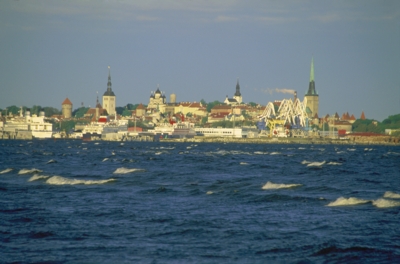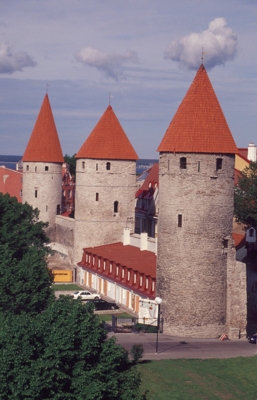
co-ordinated by the Research Institute for Managing Sustainability
You are here: Home > Training
> Tallinn  |
||||
EASY-ECO Training on Sustainability Assessment in a Transboundary Context in Tallinn, Estonia14-18 June 2010
|
|
 The fifth training in the EASY-ECO 2008-2010 series of trainings and
conferences will take place in Tallinn, the capital of Estonia. The training,
hosted by the Stockholm Environment Institute Tallinn Centre (SEI Tallinn),
will provide a possibility for young researchers to enhance their knowledge
and competences in sustainability assessment in a transboundary context.
In addition to a preceding 3-month e-learning course the training will
offer three real sustainability assessment cases of international scope,
concerning a gas pipeline, a nuclear power plant and a water canal which
will be explored in detail. Issues related to transboundary effects of
development pursued by one country on the economic, environmental and
social aspect of other countries will be discussed. The training is sponsored
by the EU Marie Curie Action, offering a grant covering all costs o participation
to most of the participants. Deadline for applications has been
The fifth training in the EASY-ECO 2008-2010 series of trainings and
conferences will take place in Tallinn, the capital of Estonia. The training,
hosted by the Stockholm Environment Institute Tallinn Centre (SEI Tallinn),
will provide a possibility for young researchers to enhance their knowledge
and competences in sustainability assessment in a transboundary context.
In addition to a preceding 3-month e-learning course the training will
offer three real sustainability assessment cases of international scope,
concerning a gas pipeline, a nuclear power plant and a water canal which
will be explored in detail. Issues related to transboundary effects of
development pursued by one country on the economic, environmental and
social aspect of other countries will be discussed. The training is sponsored
by the EU Marie Curie Action, offering a grant covering all costs o participation
to most of the participants. Deadline for applications has been set to 28
February 2010 extended to 7 March 2010.
For further information on this training opportunity, please see the ![]() Tallinn
Training leaflet (PDF, 351 kB)
Tallinn
Training leaflet (PDF, 351 kB)
Training phases: e-learning and on-site training
 EASY-ECO Trainings explore key elements in evaluation of sustainable
development such as roles of evaluation in the policy cycle, aproaches
to evaluation, stages of evaluation, methods and techniques to conduct
evaluation, and evaluation markets. After attending one of the trainings,
participants will be able to conduct actual evaluation projects as full-fledged
members of an evaluation team. In addition, the trainees will be embedded
in a thematic network of leading scientists and practitioners.
EASY-ECO Trainings explore key elements in evaluation of sustainable
development such as roles of evaluation in the policy cycle, aproaches
to evaluation, stages of evaluation, methods and techniques to conduct
evaluation, and evaluation markets. After attending one of the trainings,
participants will be able to conduct actual evaluation projects as full-fledged
members of an evaluation team. In addition, the trainees will be embedded
in a thematic network of leading scientists and practitioners.
The online phase of the training, hosted by Research Institute for Managing Sustainability of the Vienna University of Economics and Business, will be held online from March 2010 to early June 2010.
The on-site phase of the training, hosted by the Stockholm Environment Institute Tallinn Centre, will be held on 14–18 June, 2010, in Tallinn, Estonia.
The training is intended for young researchers and practitioners active in evaluation research or sustainable development. The cost of the training fee for the online phase is EUR 200 and for the on-site training EUR 250 (excluding travel and subsistence). EU-Grants are available for young researchers (with less than ten years research experience) to cover all costs (travel expenses, training fees, accommodation and living allowance).
Trainers and case studies
Both the online and on-site phase will be supported by leading evaluation thinkers and experienced trainers. The participants of the online phase can expect to interact with experts such as Frans Leeuw, Thomas Widmer, Clive George, Wolfgang Meyer, André Martinuzzi. The participants of the on-site phase will participate at one of the following case studies:
Case 1: Fennovoima Oy, a project for a new nuclear power plant in Finland
The consumption of electricity is constantly increasing in Finland at an annual rate of 1–2%. In 2006, about 90 TWh of electricity was used in Finland. The use of electricity is estimated to exceed 100 TWh in 6 to 8 years. At the same time requirements for CO2 free energy production are increasing to fight the climate change.
Fennovoima is a Finnish energy company established in 2007 which is owned by 64 industrial and energy companies. It is to produce electricity for the needs of its owners at cost price. Each owner receives production capacity by the amount corresponding to their share of ownership. Fennovoima's initiative to built a new nuclear power plant in Finland is one of the three nuclear power plant projects in process. There are already four nuclear reactors in operation and a fifth one is under construction. Fennovoima is evaluating the construction of a 1,500-2,500 MW nuclear power plant consisting of one or two reactors to one of the following municipalities: Kristinestad, Pyhäjoki, Ruotsinpyhtää or Simo.
The convention on environmental impact assessment in a trans-boundary
context by the United Nations’ Economic Commission for Europe (Espoo
Convention 67/1997) was applied to Fennovoima’s nuclear power plant
project. Finland, as the party of the origin, notified all countries
within 1000 km distance from four alternative locations of the plant,
namely Estonia, Latvia, Lithuania, Norway, Sweden, Denmark, Poland, Germany,
Austria and Russia. The competent authority for the EIA in Finland in
nuclear power related projects is Ministry of Employment and the Economy.
However, the contact point for the trans-boundary EIA is the Ministry
of the Environment.
The EIA procedure has started in January 2008, when Fennovoima submitted
the EIA programme to the competent authority, and concluded in February
2009, when the competent authority gave it's statement on the EIA report.
The trainer, Panu Kontio, works for the Finnish Environment Institute.
Case 2: The construction of the Danube-Black Sea Deep Water Navigation Canal
The first phase of the Ukrainian project the "Danube-Black Sea Deep Water Navigation Canal (the Bystroe Canal Project)" aimed at boosting the local economy and was completed in August 2004. The second phase was completed recently. The project is located in the Danube Delta, the second largest delta in Europe and includes UNESCO Biosphere Reserves and a World Heritage site. The delta is a wetland rich in plants, birds and fish.
Ukraine began development of the project without notifying Romania under the Espoo Convention. In August 2004 Romania requested an Inquiry Procedure according to Appendix IV of the Convention, believing that the Convention should have been applied to the project. Romania and Ukraine are Contracting Parties to the Convention. Romania considered that it is an Affected Party and should have been notified. However, Ukraine was of the opinion that there are no significant adverse transboundary environmental impacts. The Inquiry Commission decided in July 2006 that there are significant adverse transboundary environmental impacts and thus the Convention should have been applied.
The key issues to be discussed in the training course would include the need of the project, possible alternatives, its location and the policy implications as well as reasons for Ukraine to be of the opinion that the Espoo Convention would not apply and reasons for Romania to opt for the Espoo Convention instead of other international agreements.The trainer, Wiek Schrage, is a former Secretary to the Espoo Convention on Environmental Impact Assessment in a Transboundary Context.
Case 3: Nord Stream offshore gas pipeline in the Baltic Sea
Nord Stream AG is an international consortium of Russian, German and Dutch companies. The Company plans to construct a 1220 km long twin gas pipeline along the seabed of the Baltic Sea between Vyborg, in Russia, and Lubmin, near Greifswald, Germany. Construction is planned to start in 2010, with one pipeline operational in 2011 and the other in 2012. The pipelines will provide 55 billion cubic metres (bcm) of gas each year, enough energy to serve 26.5 million households.
The pipelines’ route passes directly through the Exclusive Economic Zones (EEZ) and/or the Territorial Sea of Russia, Finland, Sweden, Denmark and Germany. In Espoo Convention terminology these are “Parties of Origin”. Countries on the Baltic Sea that may be affected by the pipelines are called “Affected Parties” (Estonia, Latvia, Lithuania, Poland). Russia is a signatory to the Espoo Convention but has not ratified it yet. However, for the purpose of the Nord Stream project, Russia acts as a “Party of Origin”.
Nord Stream gas pipeline project is probably the biggest single project of transboundary effects ever discussed at such a large scale and volume in Europe. The Espoo Report is published in all nine languages of the Baltic Sea countries and in English. The Environmental Impact Statement published in February 2009 is produced in 5 volumes with a total of 2,527 pages.
The key issues that would be discussed in the training relate to the justification of the pipeline, its routing and alternatives, the associated environmental effects and the sustainability issues of such projects from an economic, social and environmental perspective at regional and EU levels. The process of joint international assessment of transboundary effects is explored. Science-policy interface issues will also be addressed.
The trainer, Kaja Peterson, works as a Senior Researcher at the Stockholm Environment Institute Tallinn Centre, Estonia.
Further information and application
- For more information on the content and organisation of the trainings
see the Training Info webpage and
the
 EASY-ECO
Training Preview (PDF, 1.4 MB)
EASY-ECO
Training Preview (PDF, 1.4 MB) - For further information on this training opportunity, please see
the
 Tallinn
Training leaflet (PDF, 351 kB)
Tallinn
Training leaflet (PDF, 351 kB) - For more information on EU-Grants and eligibility see the EU-Grants webpage.
| EASY-ECO |
EvAluation of SustainabilitY
- European COnferences & Training
Courses (c) 2004-2025 RIMAS — Research Institute for Managing Sustainability (co-ordinator) Vienna University of Economics and Business (WU) Franz Klein Gasse 1 A-1190 Vienna |
 |
